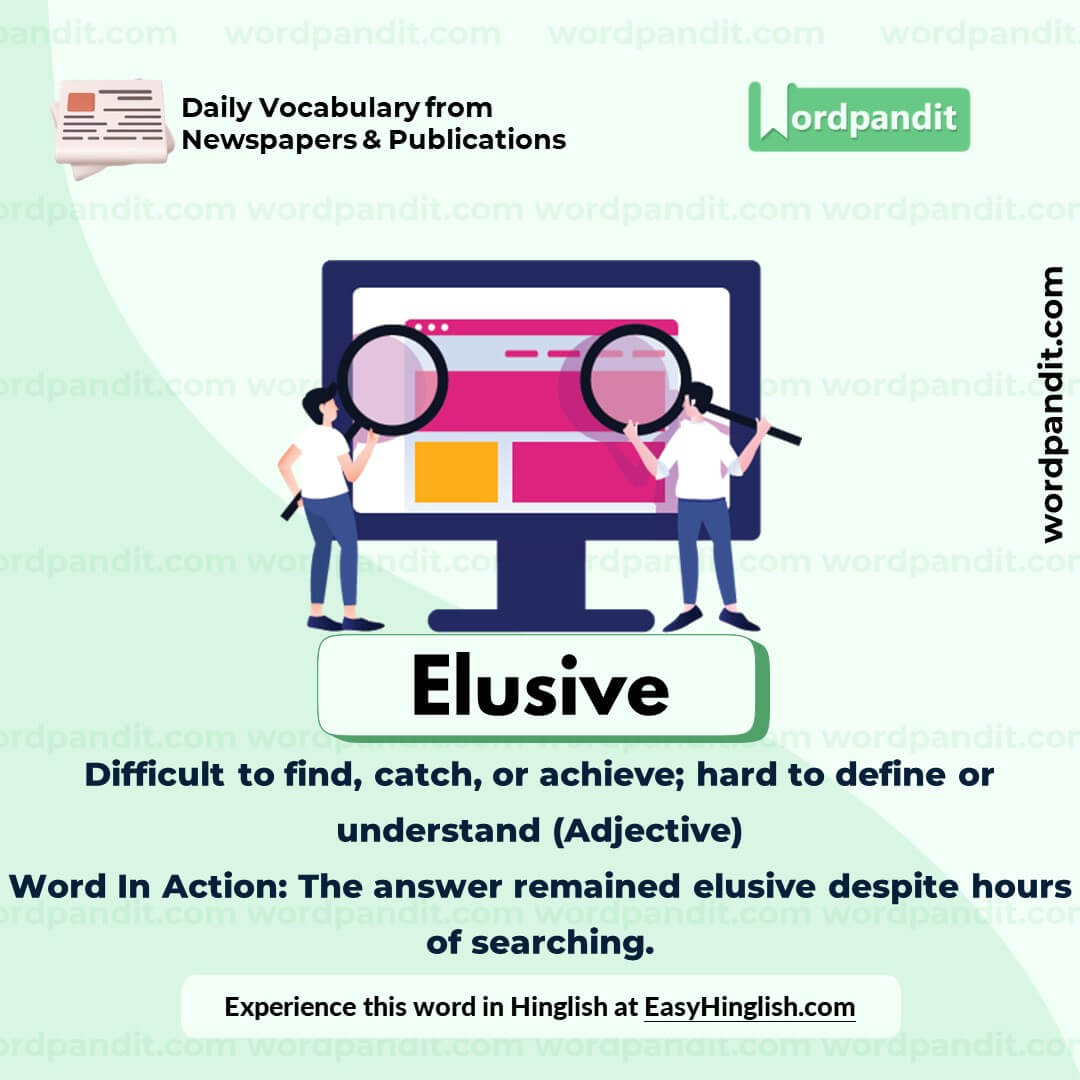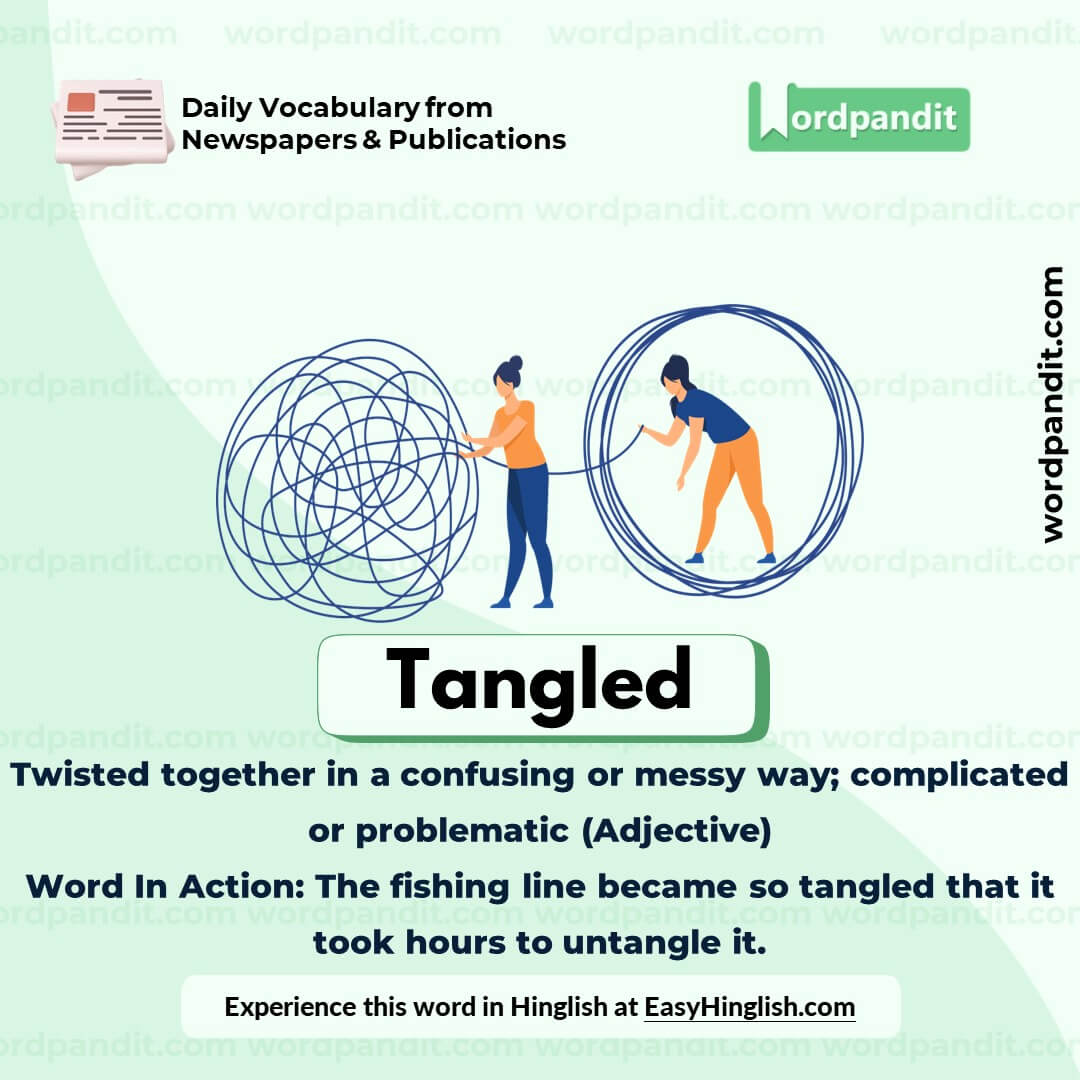Daily Vocabulary from International Newspapers and Publications
Expand Your Vocabulary with Wordpandit’s Global Vocabulary Hub
At Wordpandit, we are committed to helping you develop a truly global vocabulary by drawing from some of the most respected international publications. This section is designed to keep you ahead of the curve by introducing you to words that define global conversations and trends.
The Power of Global Sources
To help you think and communicate on a global scale, we curate vocabulary from renowned international sources, such as:
- The New York Times
- The Washington Post
- BBC
- The Guardian
- The Economist
- Scientific American
- Psychology Today
- And many more...
Stay Global, Stay Competitive
Our daily updates from international publications ensure you are consistently exposed to new words that reflect global news and developments, making sure your vocabulary is not only current but also globally relevant.
Enhance Your Global Perspective
Whether you’re preparing for international exams, aiming to excel in global business communication, or want to enhance your language skills for personal growth, Wordpandit offers the resources you need to thrive in a global context.
Effective Learning, Global Reach
Our learning methodology combines global examples, memory aids, and interactive activities, allowing you to internalize new words effectively and apply them in real-world scenarios.
Begin Your Global Vocabulary Journey Now!
Why Choose Wordpandit?
Practical Learning: Focus on words you'll actually encounter in real-world reading, enhancing your comprehension and communication skills.
Diverse Content: From current affairs to scientific breakthroughs, our varied sources expose you to vocabulary across multiple domains.
Effortless Integration: Make Wordpandit a part of your daily routine. Just a few minutes each day can significantly boost your lexicon over time.
Your Path to Vocabulary Mastery
- Visit our Daily Vocabulary section regularly
- Explore new words and their usage in context
- Practice incorporating these words into your own writing and speech
- Track your progress as your vocabulary expands
Start Your Journey Today
Embark on your vocabulary enhancement journey with Wordpandit. By consistently engaging with our daily posts, you'll build a robust vocabulary that serves you well in academic, professional, and personal contexts.
Remember, a word a day keeps linguistic limitations at bay. Make Wordpandit your daily companion in the quest for vocabulary excellence!
WORD-1: Elusive
Context:
"Frustrated by elusive names and misplaced phones? The science of memory reveals ways to improve your powers of recall." - Psyche
Explanatory Paragraph:
The word "elusive" describes something that is difficult to find, catch, achieve, or understand. It often implies a sense of something being just out of reach, whether physically, mentally, or conceptually.
Meaning: Difficult to find, catch, or achieve; hard to define or understand (Adjective)
Pronunciation: eh-LOO-siv
Difficulty Level: ⭐⭐⭐ Intermediate
Etymology: Derived from the Latin word elusivus, meaning "eluding or evading," which comes from eludere, meaning "to elude."
Synonyms & Antonyms:
Synonyms: Evasive, slippery, intangible, mysterious
Antonyms: Accessible, tangible, clear, obvious
Usage Examples:
- The butterfly remained elusive despite hours of searching through the garden.
- Her explanation of the phenomenon was so complex that it felt elusive to the audience.
- The athlete's dream of winning an Olympic gold medal had been elusive for years.
- In the novel, the protagonist searches for an elusive sense of identity and purpose.
Cultural Reference:
"The concept of 'happiness' is often portrayed as elusive in philosophical and literary works, symbolizing humanity's eternal quest for fulfillment." - Various philosophical texts
Think About It:
Why do you think some goals or concepts remain elusive, even after persistent effort? Could it be their nature, or does it reflect more about our perception and approach?
Quick Activity:
Write down three things in your life that you find elusive. Reflect on what makes them difficult to attain and consider one step you could take to bring them within reach.
Memory Tip:
Think of a magician performing a trick. The disappearing act represents "elusive" because the object is hard to see or understand—just like the meaning of the word!
Real-World Application:
The word "elusive" is commonly used in scientific and psychological contexts to describe phenomena or concepts that are difficult to pin down, such as memory, consciousness, or even theoretical particles in physics.
WORD-2: Encode
Context:
"First, the information has been encoded into memory: that is, put into a code of connections between brain cells. You can imagine encoding like building a memory structure out of blocks." - Psyche
Explanatory Paragraph:
To encode means to convert information into a specific format or structure that can be easily stored, processed, or transmitted. In the context of memory, it involves transforming sensory input into a mental representation that the brain can retain for later use.
Meaning: To convert information into a coded form (verb).
Pronunciation: en-kohd
Difficulty Level: ⭐⭐ Beginner to Intermediate
Etymology: From the prefix "en-" (into) and "code," derived from Latin "codex" (book, system of laws).
Synonyms & Antonyms:
Synonyms: Encrypt, encode, transcribe, convert
Antonyms: Decode, decrypt, decipher
Usage Examples:
- The software encodes the data to ensure its security during transmission.
- Her memories of the trip were encoded in vivid detail, making it easy to recall.
- Before sending the message, he encoded it to keep the content confidential.
- The device is programmed to encode audio signals into a digital format.
Cultural Reference:
"Encoding is central to modern technology, such as QR codes, which convert information into patterns that devices can easily interpret." - Tech Chronicles
Think About It:
How does the process of encoding memories impact the accuracy of what we recall?
Quick Activity:
Think of a memory from your last vacation. Write it down as if you were encoding it into a series of short, descriptive phrases or keywords.
Memory Tip:
To remember "encode," think of the word "code" and how we input it into devices, just like our brain inputs and organizes information.
Real-World Application:
Encoding is used in various fields, from programming to psychology. For example, in data security, encoding protects sensitive information, while in neuroscience, it explains how the brain organizes and stores memories.
WORD-3: Wander
Context:
"Second, the information has been stored, so that it doesn’t fade as soon as your mind wanders." - Psyche
Explanatory Paragraph:
The word "wander" refers to moving or traveling aimlessly without a fixed course or destination. It can also describe a person's thoughts or attention drifting from one idea to another without focus.
Meaning: To move or travel aimlessly; to drift without focus or purpose (Verb)
Pronunciation: WAHN-der
Difficulty Level: ⭐⭐ Beginner
Etymology: From the Old English word wandrian, meaning "to move about aimlessly," which is related to Old High German wandern, meaning "to hike or travel."
Synonyms & Antonyms:
Synonyms: Roam, stray, meander, drift
Antonyms: Focus, stay, settle, concentrate
Usage Examples:
- She loves to wander through the forest, enjoying the sights and sounds of nature.
- His mind tends to wander during long meetings, making it hard for him to stay focused.
- After dinner, we decided to wander around the city and explore the local streets.
- The child wandered off from the group, causing a moment of panic for the teacher.
Cultural Reference:
"Wanderlust," a term derived from the German word wandern, signifies a strong desire to travel and explore the world, reflecting a universal human curiosity for new experiences.
Think About It:
Do you think wandering, whether physically or mentally, can sometimes lead to unexpected discoveries? Why or why not?
Quick Activity:
Take a 10-minute walk today without a specific destination. Pay attention to the small details you notice during your wandering.
Memory Tip:
Picture a person strolling without a map, their path unpredictable—this represents "wander," as it means to move aimlessly.
Real-World Application:
The concept of "wandering" is used in mindfulness practices to bring awareness to how often our minds stray from the present moment and how to gently refocus.
WORD-4: Retrieve
Context:
"The information has been retrieved at the appropriate moment, so that it comes to mind when desired." - Psyche
Explanatory Paragraph:
To retrieve means to bring something back or regain access to it. In the context of memory, it refers to the process of accessing stored information and bringing it into conscious awareness when needed.
Meaning: To bring back or regain access to something (verb).
Pronunciation: ri-treev
Difficulty Level: ⭐⭐ Intermediate
Etymology: From Old French "retriver," meaning to find or regain, derived from Latin "re-" (back) and "trouver" (to find).
Synonyms & Antonyms:
Synonyms: Recall, regain, recover, access
Antonyms: Forget, lose, misplace
Usage Examples:
- She retrieved the document from her email just in time for the meeting.
- The police worked tirelessly to retrieve stolen items from the thieves.
- During the exam, he struggled to retrieve information he had studied.
- The dog quickly retrieved the ball from the lake, wagging its tail in excitement.
Cultural Reference:
"Retrieving forgotten memories is a common theme in movies, such as 'Memento,' which explores how individuals piece together their pasts." - Film Insights
Think About It:
Why do some memories seem easier to retrieve than others, even when they occurred long ago?
Quick Activity:
Think of a happy moment from your childhood. Write down the details you can retrieve and reflect on what cues helped bring the memory to mind.
Memory Tip:
To remember "retrieve," think of a dog fetching (or retrieving) a ball and bringing it back to its owner, similar to how our brain fetches information.
Real-World Application:
In technology, retrieving data from storage devices is essential for computers to function. Similarly, in psychology, retrieval practice is a powerful tool for learning and memory enhancement.
WORD-5: Tangled
Context:
"So it's just as well they also get tangled up in their fair share of mishaps, blunders and own goals every year." - BBC
Explanatory Paragraph:
The word "tangled" refers to something that is twisted together in a messy or complicated way, often making it difficult to separate or understand. It can also describe situations or relationships that are complex or problematic.
Meaning: Twisted together in a confusing or messy way; complicated or problematic (Adjective)
Pronunciation: TANG-guld
Difficulty Level: ⭐⭐ Beginner
Etymology: Derived from the Old Norse word tangl, meaning "a snare or entanglement."
Synonyms & Antonyms:
Synonyms: Knotted, twisted, jumbled, complicated
Antonyms: Untangled, straight, clear, simple
Usage Examples:
- Her hair was so tangled after the windy day that it took hours to comb out.
- The negotiations became tangled with conflicting demands from both parties.
- The fishing line got tangled in the weeds, making it impossible to reel in the fish.
- In the mystery novel, the plot was tangled with twists and hidden motives.
Cultural Reference:
The animated Disney movie "Tangled" tells the story of Rapunzel, whose long hair often symbolizes entanglement—both physically and metaphorically—in the challenges she faces.
Think About It:
Why do you think tangled situations, whether literal or metaphorical, are often harder to resolve? What can this teach us about problem-solving?
Quick Activity:
Take a piece of string and intentionally tangle it. Now, untangle it while observing your emotions and thought process. Reflect on how this mirrors dealing with complex problems.
Memory Tip:
Imagine a ball of yarn that has been left out for a playful kitten. The resulting mess of knots is a perfect representation of "tangled."
Real-World Application:
"Tangled" is commonly used to describe interpersonal conflicts, technological glitches, or legal issues where multiple factors are intertwined and difficult to resolve.
















